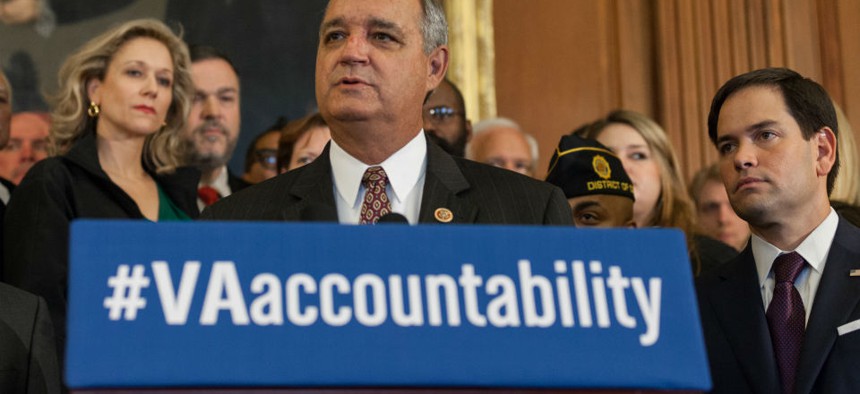
Rep. Jeff Miller, R-Fla., introduced a new measure to recoup bonuses already paid to employees already found guilty of misconduct. Caleb Smith/House Speaker John Boehner
Lawmakers Are Still Finding New Ways to Punish VA Employees
House panel looks to reform performance management and limit bonuses for VA workers.
When Congress last month passed a massive overhaul and funding initiative to fix the broken Veterans Affairs Department, the law’s architects said their work was just getting started.
On Wednesday, members of the House Veterans’ Affairs Committee followed through on that promise. Lawmakers approved yet another measure that would make it easier to fire the agency’s senior executives and take away their bonuses both proactively and retroactively.
The Comprehensive Department of Veterans Affairs Performance Management and Accountability Reform Act, sponsored by committee Ranking Member Mike Michaud, D-Maine, aims to set clearer goals against which senior VA executives’ job performance could be measured.
The legislation would establish up-front organizational goals for the agency’s senior executives, and use them in reviewing performance. It would also require that any Senior Executive Service employee who receives a rating of less than “fully successful” in consecutive years be removed from the SES. Additionally, any doctors or dentists who do not receive a successful review would not be eligible to receive performance pay.
VA medical staff receive a base salary, and typically also receive a percentage of that salary as a bonus, based on their performance rating.
Another bill sent to the House floor was a measure -- introduced by the committee’s Chairman Jeff Miller, R-Fla. -- to recoup bonuses already paid to employees later found guilty of misconduct. The legislation does not spell out specific criteria that would qualify an employee for the retroactive penalty, leaving that to the VA secretary’s discretion. The employee would have to be given notice and the opportunity for a hearing.
A similar measure, which specifically targets bonuses given to employees found guilty of manipulating patient wait list data, was introduced in the Senate with bipartisan support.
Former VA Secretary Eric Shinseki in May rescinded an $8,500 performance award given in 2013 to Sharon Helman, who served as director of the Phoenix VA hospital at the epicenter of the recent scandal. VA said that bonus, however, was originally awarded due to “administrative error.” Federal employee advocates and the VA itself have since questioned the agency’s authority to rescind a bonus for malfeasance, hence the push for legislation.
The compromise bill President Obama signed into law in August expedited the process for firing or demoting senior executives at VA. It did not address employee bonuses, though before resigning Shinseki prohibited any performance awards for Veterans Health Administration’s SES employees in 2014.
The Merit Systems Protection Board, which saw its ability to reverse a negative personnel action diminished by the August VA reform law, has said the firing provision raises due process concerns and has written to the White House to air its grievances.







